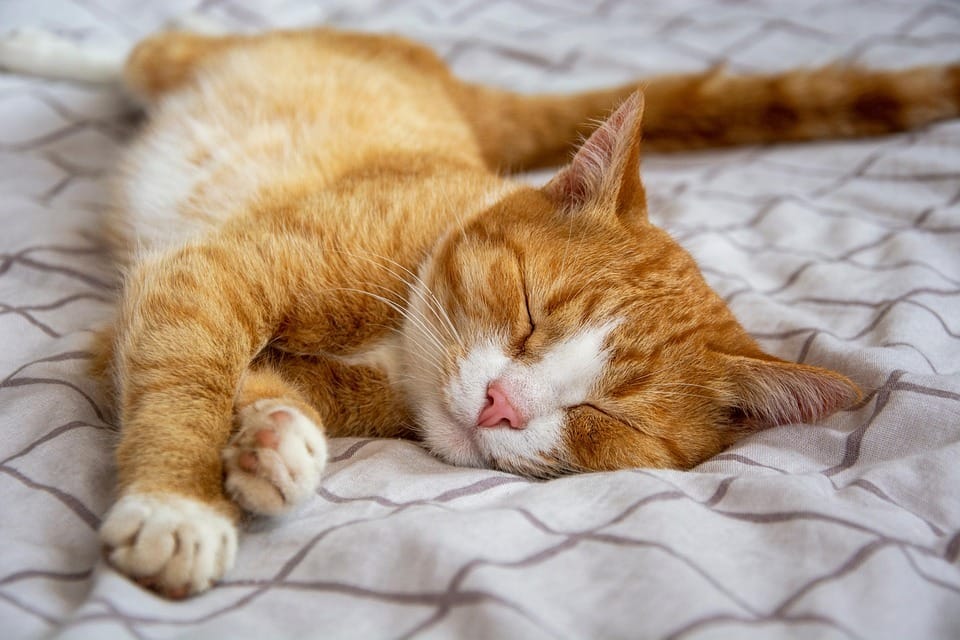- Your Pet's Wellbeing
- Posts
- How Much Sleep Is Too Much for a Cat?
How Much Sleep Is Too Much for a Cat?
Depends On the Cat!
Cats are well known for their love of sleep and then some! In fact, it’s not uncommon for a healthy feline to sleep up to 16 hours a day. But how much sleep is too much for a cat? And when should a cat parent start to worry if their cat sleeps all day?

Understanding Normal Cat Sleep Habits
Cats are crepuscular creatures, meaning they are most active at dawn and dusk. This schedule comes from their wild ancestors, who hunted small prey during these times. Between these energy bursts, domestic cats tend to sleep and rest A LOT! Most healthy adult cats sleep between 12 and 16 hours per day, while kittens and senior cats may sleep even more, sometimes up to 20 hours a day.
The length and pattern of your cat's sleep can vary based on age, personality, health, and environmental stimulation. For example, an indoor cat with fewer activities may sleep more than an outdoor cat who spends hours exploring or hunting. Also, some breeds, like Ragdolls and Persians, are naturally more laid back and tend to nap more often than active breeds like Bengals or Siamese cats.
Do Cats Sleep Too Much?
It’s easy to wonder as I have so many times “Do cats sleep too much?” especially when it seems like your favorite feline is always napping. The key is to determine whether your cat’s sleep habits are normal for their lifestyle, i.e. indoor v. outdoor cat, or if your cat’s sleeping pattern has suddenly changed. A cat who has always loved long naps likely isn’t cause for concern. However, if your usually energetic cat starts sleeping significantly more or becomes uninterested in play or interaction, it could be a red flag.
Cat parents should watch for signs that their cat’s excessive sleep is paired with other unusual behaviors. These include reduced appetite, hiding, weight gain or loss, vomiting, or lethargy when awake. If you notice any of these along with increased sleep, it's time to contact your vet.
Should I Worry If My Cat Sleeps All Day?
A common concern from many cat owners if they should worry if their cat sleeps the day away. The answer really depends on context. If your cat is elderly, napping most of the day may be a normal part of aging. Older cats tend to slow down naturally and may need more rest to recharge. Similarly, if your cat had a very active play session or was exposed to a new environment or visitor, they might need a long nap to recover.
On the other hand, a sudden shift from playful and alert to always-sleeping could be a symptom of underlying health problems. Conditions like hypothyroidism, diabetes, kidney disease, or even depression in cats can lead to increased drowsiness or lethargy. Cats are masters at hiding illness, so subtle changes in behavior like sleeping more should never be ignored.
Age and Sleep: Senior Cats vs. Kittens
Age plays a big role in cat sleep habits for cats. Kittens need a lot of sleep, even up to 20 hours a day, to support their rapid growth and development. Their sleep is often punctuated by bursts of hyperactivity, followed by complete collapse into deep rest.
Senior cats, usually defined as those cats that are more than 10 years old, also tend to sleep more. Their energy levels decline with age, and they may experience joint stiffness or arthritis that discourages movement. However, if your senior cat is suddenly sleeping more than usual or shows signs of disorientation or confusion, it could signal age-related cognitive decline or other health issues that require veterinary attention.
Ways to Keep Your Cat Mentally and Physically Stimulated
If you’re concerned that your cat may be sleeping out of boredom rather than biological need, there are several ways to encourage activity. Rotate engaging toys, introduce food puzzles, or create vertical spaces like cat trees to promote exercise and exploration. Try to schedule daily play sessions, especially during the evening, to sync with your cat’s natural activity windows.
Enrichment isn’t just important for younger cats as even senior cats benefit from gentle mental and physical stimulation too. Use softer toys, cozy window perches, or even gentle brushing sessions to keep your cats engaged without overexertion.
When You Should Take Your Cat to the Vet
While long naps are perfectly normal for cats, you should contact your vet if:
Your cat is sleeping more than 18–20 hours a day and is not a kitten or senior.
There’s a sudden change in your cat’s sleep patterns.
Your cat seems unusually lethargic when awake.
You notice other signs like poor appetite, weight loss, or behavioral changes.
Your vet will typically run blood tests or examine your cat’s thyroid, kidneys, or overall metabolic health to determine the cause. Early diagnosis is key, especially in aging cats, to manage chronic conditions and improve quality of life.
Final Thoughts on Cat Sleep Habits
While cats are famously sleepy animals, it’s important to know your own cat’s unique patterns and personality. It’s important to monitor your cat’s normal sleeping patterns and if there are any significant changes, talk to your vet with your concerns. By paying close attention to changes and staying proactive about your cat’s health, you can make sure your cat’s sleep habits are a sign of wellness, and not a warning sign.